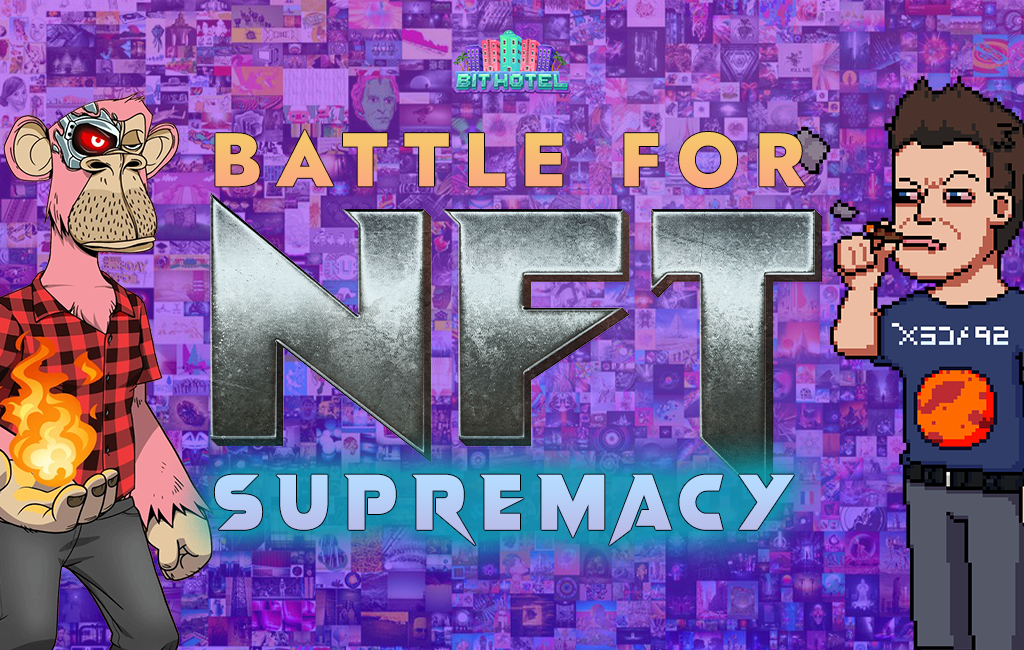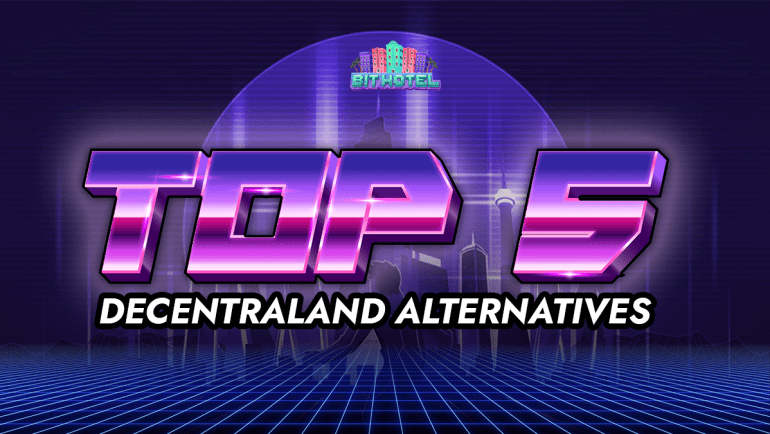16622Views 0Comments


Battle for NFT Supremacy: A Look at the Top Marketplaces and the Rise of a Potential Disruptor
Have you ever heard of a digital art piece selling for millions of dollars? What about a virtual land plot selling for a fortune? Welcome to the world of Non-Fungible Tokens (NFTs), where unique digital assets are bought and sold on blockchain networks for mind-boggling prices. While the concept of NFTs might seem baffling at first, it’s hard to ignore the impact they’re having on the art world. NFT marketplaces are cropping up all over the internet, making it easier than ever for artists and collectors to exchange these one-of-a-kind digital items. In this article, we’ll explore the three most popular NFT marketplaces and how they’re changing the face of art and collectibles.
1. Opensea: The Lion of NFT Marketplaces
OpenSea is a prominent NFT marketplace that has gained widespread attention in recent years due to the growing interest in unique digital assets. Founded in 2017 by Devin Finzer and Alex Atallah, OpenSea offers a platform for buying and selling non-fungible tokens directly at a fixed price or through an auction. The marketplace has become the largest NFT marketplace, with the company’s revenue reaching $95 million in February 2021 and $2.75 billion in September of the same year. In January 2022, OpenSea was valued at an impressive $13.3 billion.
Recently, Opensea, the largest NFT marketplace, announced that it is dropping fees in response to a major change in the NFT market that started in October 2022. Opensea stated that it had noticed a significant shift of users to NFT marketplaces that do not fully enforce creator earnings and that most of the sales volume has moved to a no-fee environment. This shift was further fueled by the recent rise of new marketplaces like Blur, which has captured $1.4 billion in all-time sales volume in a short period. However, despite the competition, Opensea still maintains a significant advantage in terms of all-time sales, with $34.53 billion in total.
Opensea’s new changes are aimed at striking the right balance of incentives and motivations for all ecosystem participants, including creators, collectors, and power buyers and sellers. To achieve this, the company is updating its operator filter to allow sales using NFT marketplaces with the same policies, including Blur. This marks the start of a new era for Opensea, and the company is excited to test this new model. By taking these steps, Opensea hopes to remain the top choice for creators and collectors looking to buy and sell NFTs in a fair and transparent marketplace.
2. Magiceden: The Cheetah of NFT Marketplaces
Magic Eden has quickly risen to become one of the most popular NFT marketplaces on the Solana blockchain since its launch in September 2021. The platform was created as a home base for NFT collections on Solana and has gained widespread recognition for its user-friendly tools, community-focused approach, and diverse range of tokens. Its emphasis on simplicity, with an intuitive interface for creating and listing NFTs and low transaction costs and fee-free listing process, has made it an attractive option for creators and collectors alike. In June 2022, Magic Eden made headlines when it raised $130M in funding at a valuation of $1.6 billion, a testament to the platform’s rapid growth and popularity.
Despite being a relative newcomer to the NFT marketplace scene, Magic Eden has quickly made a name for itself as a dominant player on the Solana blockchain. According to data from Nansen, the platform handles at least 90% of the NFT trading volume on Solana each week. This is a significant feat, given that NFT trading volume on Ethereum has declined significantly since the beginning of 2022, while Solana’s trading volume has remained steady.
In its quest to become a true multi-blockchain marketplace, Magic Eden has recently launched on Polygon, a popular scaling solution for Ethereum. However, it faces stiff competition on this platform from the likes of OpenSea and a few lesser-known marketplaces like NFTrade, Treasureland, and Refinable. Despite these challenges, Magic Eden is forging ahead with ambitious plans to expand the purpose of an NFT marketplace.
Magic Eden wants to transition from a strictly transactional model to something more akin to a social networking platform as the platform expands. Garrett Miller, a co-founder of the business, has stated that the team hopes to provide a place where users can communicate and socialize inside the NFT ecosystem. This strategy aims to set Magic Eden apart from its rivals, who often provide instant rewards without fostering long-term customer involvement.
Notwithstanding how big this change is, there are still difficulties involved. In a competitive industry that is continuously changing, Magic Eden will need to carve itself a special niche if it is to be successful. Yet, the platform’s strong emphasis on community and user interaction, together with its user-friendly features and minimal transaction costs, paves the way for its future growth. It will be intriguing to observe how Magic Eden adapts and expands to take advantage of new possibilities and difficulties as the NFT market landscape continues to change and develop.
3. Blur: The Elephant of NFT Marketplaces
As the world of NFTs continues to expand, new marketplaces are emerging to meet the needs of digital asset traders. One such player is Blur, a well-designed marketplace and NFT aggregator that offers advanced analytics, excellent portfolio management capabilities, and the ability to compare NFTs on multiple marketplaces.
Prior to its official launch, Blur offered beta-testing access to NFT traders who referred the most users to sign up on its waiting list. The platform’s founders and developers remain pseudonymous and only use pseudonyms, such as the founder known as “Pacman.” Despite its recent entry into the NFT market, Blur has already obtained funding from numerous venture capitalists, including Paradigm, and has the potential to revolutionize the way professional NFT traders approach the market.
In the heated competition among NFT marketplaces, blur emerged as a game changer, fueling the NFT ecosystem’s recovery in the latter half of 2022. According to market analysts, blur’s NFT sales volume reached $484 million in December 2022, nearly doubling that of OpenSea, the world’s largest NFT marketplace.
Blur’s unique features include faster NFT sweeps and snipes, real-time price feeds, a sorting function based on price, a more intuitive interface, and no trading fees for NFT sales. As an aggregator, it connects to other popular marketplaces like OpenSea, LooksRare, and X2Y2, making it easier for traders to access a wide range of NFTs. Traders can also view their digital assets through Blur’s portfolio tab, which provides information on rarity, value, profit and loss, and more.
Blur’s rapid growth in the latter half of 2022 is a clear sign that it is a potential elephant sleeping in the NFT market. Its unique features and ability to connect to other popular marketplaces make it an attractive option for traders, and its impressive sales volume puts it in a strong position to disrupt the market. As we continue to see signs of growth in this recessionary time, it will be interesting to see how Blur continues to evolve and shape the future of the NFT ecosystem.
Conclusion
As the NFT market continues to evolve, it’s evident that the competition between Opensea, MagicEden, and Blur is heating up. With Blur’s impressive sales volume and increasing adoption, it’s not a stretch to imagine that it may eventually surpass OpenSea as the most popular NFT marketplace. However, this shift in market share is not without its challenges. NFT creators are already feeling the pressure as platforms prioritize NFT flippers and professional traders over project creators. As the pioneer platform in the NFT industry, OpenSea has a significant advantage in terms of brand recognition and user base. However, Blur’s faster transaction speeds and user-friendly interface have already proven to be major draws for NFT traders. Ultimately, it will be up to the users to decide which platform emerges as the leader in the NFT market.
Now that you are here, make sure to check out the Bit-Hotel game. Completely for free! Click here to play.

